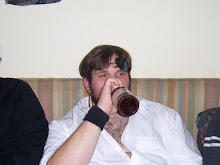The defining dynamic of their relationship is Bad's alcholism, which Jean isn't outrightly judgmental of, but is apprehensive of nonetheless because of her young child, Buddy. In what is the film's most contrived sequence, Buddy is lost in a mall by Bad after he stops in a tavern for a drink, which (along with losing Jean's trust and her leaving him) leads to his inevitable drive to get sober. Not that the sequence doesn't work, just that for a movie so honest about its characters and their lives, it's something that not only isn't original, but which has been telegraphed over and over again in scenes where Jean asks Bad not to drink around her son. What intrigues me about the film as a redemption story, however, even given this bit of a misstep, is that the alcholism is never center stage, and Jean never pressures Bad to give it up totally. Instead, through a series of events, not just involving Buddy, but also his declining health and income among other things, he begins to realize exactly how expansive the destruction of his behavior and lifestyle is on his everyone and everything around him, which is what ultimately leads him to make the choice to get sober, despite earlier protestations by his manager, a doctor, and even his friends. It seems startlingly realistic to suggest that alone with themselves is the only way for an addict to really change their behavior (with support, but not provocation or guilting) in a genre often rife with preachy and even dogmatic scenes of familial interventions that lead the protagonist to enter a program and get straight. Reality rarely happens that way.
Also strikingly, Bridges and Gyllenhaal look like real people, and not stylized reality or idealized, "Hollywood" real. This shouldn't be that much of a surprise, given that both actors are apparently as down-to-earth as could be for stars of their magnitude. Bridges has famously never shied away from his regular guy image, even utilizing parts of his own bland and boring personal wardrobe for his roles in THE FISHER KING and THE BIG LEBOWSKI, and Gyllenhaal frequently spends her spare time hanging out with her husband Peter Saarsgard and their child instead of making headlines. In fact, her only major tabloid moment came from her feeding her child in public, which is of course not only natural and healthy, but so...so...normal. As such, they are, as performers, as unafraid to be themselves on screen as they are in their day to day lives. That is of great benefit to the film.
The acting and deviations from character cliches aside, the trajectory of the film's story overall remains somewhat predictable, and despite the ending's bittersweet and truthful poignancy, it feels a little like the screenplay is just going through the motions, ticking off marks as it chugs along. And, despite the title song, which actually is quite a good song, a lot of the music is merely okay, more apt to get stuck in your head as a melodic memory than actually retaining the form and substance of a great Country-Western song. For a character as forgotten yet legendary a songwriter as Bad Blake, I kind of wish they had just used a bunch of really great, well-known standards. In a fictionalized context, no one but hardcore fans would even pay any attention to them, or likely know who the original songwriter was anyway (sadly). For proof, just ask anyone you know who says they listen to country music who wrote "Poncho and Lefty" and see the blank stares as they both don't know the song or, if they do, that it wasn't written by Willie Nelson. And that's a prominent standard. Anyway, these are minor quibbles, as both are more than servicable to the film as it exists.
The film ultimately remains, first and foremost, a showcase for its two very capable leads, and as an actor's picture, it's pretty great. Bridges recently won an Oscar for his performance, and some have commented that he didn't deserve it because the role of Bad Blake felt tailor-made for him. To that I ask, isn't that the first clue of true greatness? Who else could play bad? Who would (or could) replace Marlon Brando in ON THE WATERFRONT, or James Dean in REBEL WITHOUT A CAUSE, or Barbara Stanwyck in DOUBLE INDEMNITY, or Michael Douglas and Charlize Theron in WALL STREET and MONSTER, respectively? The reason a performance remains memorable and spectacular is because the performer becomes inseparale from their role. They are the character. Bridges and Gyllenhaal turn in two such performances here.






No comments:
Post a Comment